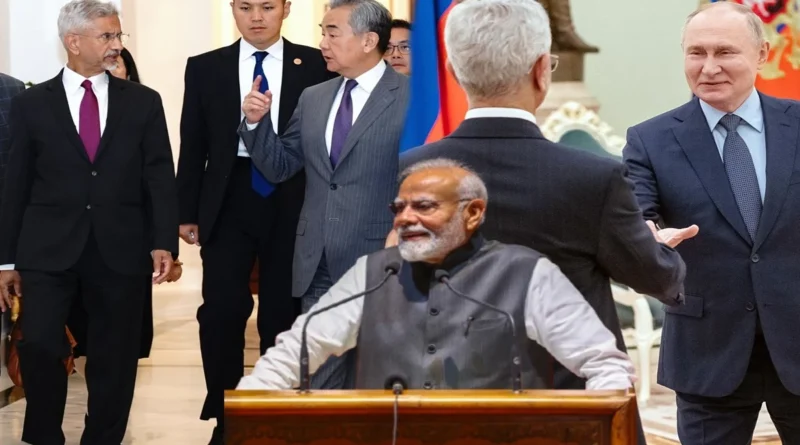India Stands Firm Against U.S. Tariff Pressure, Strengthens Strategic Ties with Russia Amid Tensions
U.S. President Donald Trump is once again using his “tariff card” to pressure countries around the world, and this time, India is in his crosshairs over oil imports from Russia. After first threatening a 25% tariff and later increasing it to 50%, Trump is attempting to intimidate India into signing a trade deal on American terms.
But rather than bowing to pressure, India has chosen to face the tariff war head-on. In response, a new geopolitical grouping also seems to be taking shape — one that the U.S. may not be pleased with. Russia and China, long-time American rivals, have been aiming to form an RIC (Russia-India-China) alliance, and now India appears to be making concrete moves in that direction.
While Chinese Foreign Minister Wang Yi is currently visiting India, Russian President Vladimir Putin has spoken with Indian Prime Minister Narendra Modi twice — both before and after his meeting with Trump in Alaska, briefing him on the outcomes. Meanwhile, Indian External Affairs Minister S. Jaishankar has already met with Wang Yi and is now headed to Russia.
Jaishankar Departs for Key Russia Visit
On Tuesday, August 19, External Affairs Minister Dr. S. Jaishankar embarked on a three-day visit to Russia aimed at reinforcing the time-tested and strategic India-Russia partnership.
The Ministry of External Affairs (MEA) announced that Jaishankar will co-chair the 26th session of the India-Russia Inter-Governmental Commission on Trade, Economic, Scientific, Technological, and Cultural Cooperation, scheduled for Wednesday.
He is also expected to hold talks with his Russian counterpart Sergey Lavrov, with the Ukraine conflict and Trump’s new peace push likely on the agenda. The MEA stated that Jaishankar and Lavrov will review the bilateral agenda and exchange views on regional and global issues.
“The visit aims to further strengthen the longstanding and time-tested India-Russia Special and Privileged Strategic Partnership,” the MEA said in its statement.
Critical Timing of the Visit
Jaishankar’s visit comes at a sensitive time when India-U.S. relations are under strain due to Trump’s decision to double tariffs on Indian goods to 50%. This includes a 25% penalty specifically targeting India’s purchase of Russian crude oil.
Notably, this diplomatic mission follows recent talks held in Russia by Indian National Security Advisor Ajit Doval, focused on bilateral cooperation in energy and defense.
The alignment of Jaishankar’s visit with Putin’s outreach to Modi, as well as China’s diplomatic engagement, signals a possible shift in India’s foreign policy posture — one that prioritizes strategic autonomy over submission to U.S. trade coercion.
Strategic Context: India at the Center of Global Power Play
With growing pressure from the United States and increasing global polarization, India appears to be recalibrating its alliances. As America uses tariffs as leverage, India is choosing dialogue with Moscow and Beijing — countries that are themselves looking to shape a post-Western world order.
India’s continued oil imports from Russia, coupled with its active diplomacy with both Russia and China, send a clear signal: India will not be strong-armed into economic or diplomatic concessions.
Stay updated with International News in Hindi on Prabhasakshi

